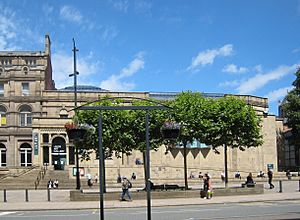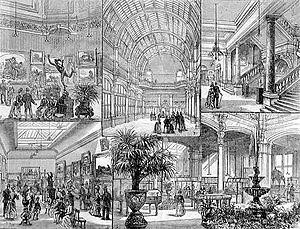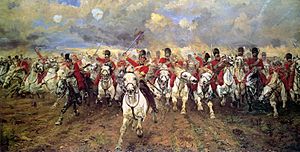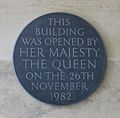Leeds Art Gallery facts for kids

Main entrance and frontage
|
|
| Established | 3 October 1888 |
|---|---|
| Location | The Headrow Leeds, LS1 3AA |
| Type | art gallery |
| Key holdings | 20th-century British art |
| Visitors | 453,088 (2013) |
The Leeds Art Gallery is a famous art museum in Leeds, West Yorkshire, England. It is part of the Leeds Museums & Galleries group. The gallery is well-known for its amazing collection of British art from the 1900s. In 1997, the British government said this collection was "nationally important."
The gallery also has art from the 1800s and even older. It is a special building called a Grade II listed building. This means it's protected because of its history and architecture. Leeds City Council owns and runs the gallery.
On one side, it connects to the Leeds Central Library. On the other side, a bridge links it to the Henry Moore Institute. They even share some sculptures! A large sculpture by Henry Moore, called Reclining Woman: Elbow (1981), stands right outside the entrance. Inside, you can see Leeds' oldest public sculpture, a marble statue of Queen Anne from 1712.
Right in front of the gallery is Victoria Square. At one end of the square is the city's war memorial. This square is often used for events and gatherings. This is because the gallery's raised entrance makes a great spot for speakers.
Contents
History of the Gallery
The idea for this art gallery started in 1876. A group called the Leeds Fine Art Society formed a committee to make it happen. Important people like the Marquis of Ripon and architect William Henry Thorp were part of this group.
The gallery building was constructed between 1886 and 1888. William Henry Thorp designed it as an addition to the Municipal Buildings. These buildings now house the Leeds Central Library. The gallery officially opened on October 3, 1888. It was first called the Leeds City Art Gallery.
People raised money from the public to pay for the gallery. This was done to celebrate Queen Victoria's Golden Jubilee in 1887. The Mayor, Alderman Archibald Witham Scarr, opened the gallery. A famous artist, Hubert von Herkomer, was also there.
What is now the Tiled Hall Café used to be the sculpture gallery. It was changed from a reading room in the library. It was special because it was lit by electricity, which was new at the time. Other galleries used natural light from roof windows. The new building had a central area with two floors and a glass roof. It also had a fountain made of special Burmatofts faience pottery. Later, a floor was added to create more space.
Supporting the Art Collection
In 1912, the Leeds Art Collections Fund was created. This group helps the gallery buy new artworks. It is now known as the Leeds Art Fund. In 2012, the fund celebrated 100 years. They showed 430 artworks they had helped the city acquire.
Modern Changes and Renovations
The gallery was updated in 1982. The main entrance was moved from the east side to the south, facing the Headrow street. A new part was added for the sculpture collection.
Later, three old Victorian houses were turned into the Henry Moore Institute. This institute is now connected to the gallery by a bridge. It holds many of the gallery's sculptures. Queen Elizabeth II opened the new building on November 26, 1982.
A big renovation costing £1.5 million finished in June 2007. This project opened up the beautiful Victorian Tiled Hall. This hall is now a café and bookshop, connecting the gallery and the library. The former Queen's Gallery was renamed the Arnold Ziff Gallery. It was named after a local businessman who supported the arts.
On the first floor, you can walk directly from the gallery to the Art Library. The gallery also has a lecture theatre on the ground floor. It is named after Henry Moore and hosts many different events.
The gallery closed again in January 2016 for more major renovations. It reopened on October 13, 2017. During this work, the glass roof in the Central Court Gallery was uncovered. It had been hidden by a false ceiling. An abstract wall painting by Lothar Götz was added to make the Victorian staircase brighter.
Art on Display
The Leeds Art Gallery has many amazing artworks. Here are some of the most important ones you can see.
Ten Key Works to See
The gallery suggests "Ten key works" for visitors who have less time. These are some of the most famous pieces:
- Retribution, by Edward Armitage, from 1858
- The Age of Bronze, by Auguste Rodin, created in 1877 (cast in 1906)
- The Valley of Shadows, by Evelyn De Morgan, from 1899
- Maternity, by Jacob Epstein, from 1910
- Praxitella, by Wyndham Lewis, from 1921
- Reclining Figure, by Henry Moore, from 1929
- Painting, by Francis Bacon, from 1950
- Postcard Flag (Union Jack), by Tony Cragg, from 1981
- Maquette for Brick Man, by Antony Gormley, from 1986
- The Artist in her Studio, by Paula Rego, from 1993
Other Notable Artworks
Many other important works are also on display:
- Paintings
- The Shadow of Death (1870–73), by William Holman Hunt
- Scotland Forever! (1881), by Elizabeth Thompson
- The Bridesmaid (1883–85), by James Tissot
- The Lady of Shalott Looking at Lancelot (c.1894), by John William Waterhouse
- The Tin Mine (1942), by Graham Sutherland
- Sculpture
- Hieroglyph - by Barbara Hepworth
- Mother and Child - by Henry Moore
Images for kids
See also
- Listed buildings in Leeds (City and Hunslet Ward - northern area)
 | Audre Lorde |
 | John Berry Meachum |
 | Ferdinand Lee Barnett |









